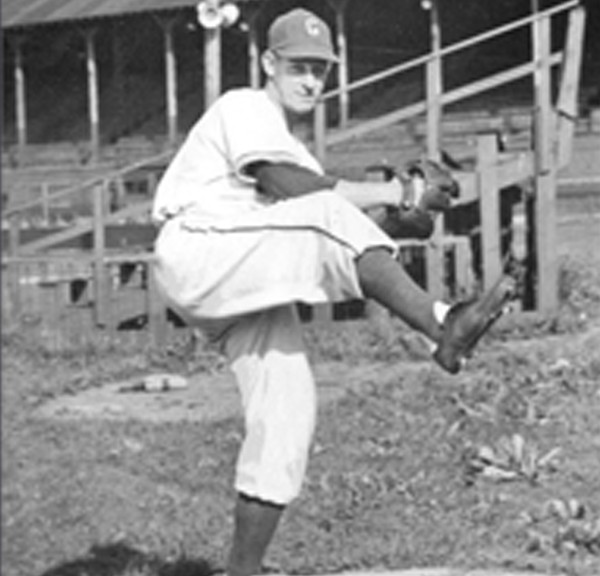
(Editor’s Note: Left handed pitcher John B. Coakley, a Washington , D.C. native, had a six-year minor league baseball career, the final two seasons of which were in Gloversville. After his retirement from the game in 1951, Coakley remained a resident of the Upstate New York Region, until his death on February 17, 2012.)
My first baseball “contract” was a matchbook cover. I was 21 years old in 1946, just back from the service in World War II. After the war, professional baseball was desperate for players. I was scouted by the Philadelphia Athletics and “signed” by Earle Mack, son of Connie Mack. Earle met me at a restaurant, pulled out a matchbox, and signed his name on the cover. “Here, take this to Lew Krausse, the manager of our club in Federalsburg, Maryland,” Mack said. “Tell him I want you to play in the Athletics organization.” I took the matchbook to Federalsburg and they signed me. That first year with Federalsburg in the (Class D) Eastern Shore League was difficult for me. I was winless, 0 and 10, because I hadn’t developed a curveball yet and they hit my fastball pretty hard.
The A’s sent me to Red Springs, NC in the Tobacco State League in ’47 to work on my curve. Our best player at Red Springs was Don Carter. He could pitch, played the field well, and was our best hitter. But he quit baseball after that season and I wondered, ‘Why the hack would he do that?’ Well, he made the correct decision. He pursued professional bowling instead, and became one of the greatest pro bowlers in history. In 1948, I got sold to the St. Louis Browns organization and they assigned me to Aberdeen, South Dakota in the (Class C) Northern League. It was my best year in baseball. I went 12-6. It was the first of two consecutive years that I had Don Larsen as a teammate… 1948 in Aberdeen and 1949 in Springfield, IL. Larsen, of course, became famous for pitching a World Series perfect game for the 1956 Yankees. In the minors, he was infamous for partying. One night, we were all at a road house after a game. Larsen was playing pinball and he got mad at the machine and put his fist right through the glass table top. He hurt his pitching hand and had to play outfield until his hand healed.
In 1949 I got promoted to Class B Springfield, IL (in the Three I (Illinois-Indiana-Iowa) League). It was the highest level I ever reached in baseball. I had a teammate at Springfield names E. Clarence Wilner, our first baseman. He also ended up playing for the New York Yankees and they changed his name to Ed Levy to attract Jewish Fans.
I arrived in Gloversville May 10, 1950. I immediately like the place --- nice town, nice people. I’ve lived in Upstate New York ever since. First person I bumped into in Gloversville was my catcher Jack McKeon. Wonderful guy. We became best friends right away. He really knew how to warm up a pitcher, how to make his pitcher confident. I used to tell him, ‘Jack, you make me feel like Whitey Ford, and I know I ain’t no Whitey Ford. Jack was the guy responsible for me converting to Catholicism. It’s the nicest thing anybody has ever done for me. He’s the most devout Catholic I’ve ever known. He goes to mass every day. I like to kid him by telling him that he probably knows more priests that ballplayers. One night at Gloves Park in 1950, Jack and I were in the bullpen and the mosquitoes were eating me alive. “Don’t worry, Coak,” he said. “I’ll handle that.” So, he started a little brush fire to smoke away the mosquitoes. Well the darn thing spread and pretty soon the whole park was filled with smoke. The umpires had to suspend play for 30 to 40 minutes to put out the fire and let the smoke clear. It did get rid of the mosquitoes, though.
I had a down year in Gloversville in 1950 (6 wins, and 16 losses), but the team still wanted me back for ’51 because the Glovers really lacked pitching. I was doing pretty well in ’51 (4 wins, 2 losses) when I hurt my arm. I went to the manager, Al Barillari, and told him my arm hurt and I couldn’t pitch. He said, “Well then, we gotta put you on the disabled list.” I didn’t know what the disabled list was. I’d never been injured in baseball before. ‘Do I get paid on the disabled list?’ I asked, and Barillari said, “No.” So that was it for baseball for me. My salary with the Glovers was $250 a month. I had just gotten married and I needed an income. So I walked out of Barillari’s office, drove to Schenectady, and took a job with General Electric. Best career decision of my life. I made a nice living with GE. The most I ever made in baseball was peanuts. I had a lot of fun playing pro ball. I made a lot of friends. And I’ve got a lot of wonderful memories of the game. But I sure am glad that I got out when I did.


